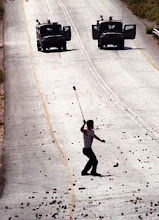Of notoriety were Israel's Unmanned Aerial Vehicles (UAVs) - or drones -, such as the Predator and the Heron, which not only carried out reconnaissance missions crucial to Israeli's deadly "targeted strikes", but which were also used for bombing missions in the Strip, resulting in a high number of civilian casualties. Amnesty International claims that many drones dropped bombs containing small, cube-shaped shrapnel that did considerable physical damage on contact; a Syrian film-maker told me this July that he met many Gazans who had limbs amputated from this type of shrapnel, though they were at a considerable distance from the site of bomb impact.
In December, the Israelis signed at $91 million contract with the British RAAF to supply drones in the fight against the Taliban in Afghanistan. Increased drone attacks in Afghanistan and Pakistan have been blamed for hundreds of civilian deaths over the past year. The Heron TP, or Eitan, a newer, beefed-up version of the Heron, which can carry more than a ton of ordnance and which is thought to have been developed for war with Iran, was also "battle-tested" in Operation Cast Lead.
 (Brasilian soccer star Ronaldo greets Shimon Peres in Brasil)
(Brasilian soccer star Ronaldo greets Shimon Peres in Brasil)Unfortunately, now the Brazilian government has ignored the demands of national and international civil society groups calling for the ban of arms purchases from Israeli defense groups, and instead has signed a deal for $350 million to buy the Heron UAV, the same model used in the Gaza affair, for use by the Brazilian police. In November, Lula met with Israeli President Shimon Peres, accompanied by Israeli Defence officials and Elbit Systems and Israeli Aerospace Industry officials, to discuss the arms purchase. The Brazilian government justified the purchase on the pretext of fighting drug trafficking on its extense borders and gang activity. A few weeks prior to the November visit, Brazilian police claim that a helicopter was shot down over a favela in Rio de Janiero using a "short-range rocket". Poverty, gang wars, and ruthless policing have killed thousands in the Brazilian slums. Brazil will be host to the coming 2014 World Cup and the 2016 Olympic games, security for these events being another pretext for the deal.
When the first three UAVs arrive in Brazil by April 2010, they will be the first to be employed by a police force. The implications are worrisome. Not only will drones – possibly armed with bombs – be patrolling the skies over the Amazon, their presence over the favelas reaffirms the military presence in Brazil’s most marginalized communities, to the detriment of more just and lasting social solutions. Furthermore, the mammoth deal not only legitimizes Israel’s criminal use of these instruments of death in the occupation and repression of Palestinians, Brazil’s money lends key support to Israel’s economy. The Boycott, Divest and Sanctions (BDS) movement, born in Palestine, has been working with civil society groups and governments around the world to stop funding Israeli Apartheid in Palestine, similar to the South African boycott movement of the 1980s. The BDS movement is such a threat to the Israeli economy that dozens of non-violent Palestinian activists have been the targets of threats, harassment and detention. In September, after meeting with Norwegian officials, Stop the Wall Youth Coordinator and BDS activist Mohammad Othman was detained by the Israelis, though no charge was pressed against him. Citing “ethical concern”, the Norwegian government had recently dropped its plans to invest a pension fund in Elbit Systems, maker of Israeli drones and security cameras for the Apartheid wall. Othman was released on January 13th.
Becoming a world leader requires not just military and economic strength. By militarizing the slums of Rio and supporting the occupation of Palestine, Brazil is losing the moral high ground. Grassroots organizing is key to ending the Israeli occupation and building true solidarity between the peoples of the Global South.



